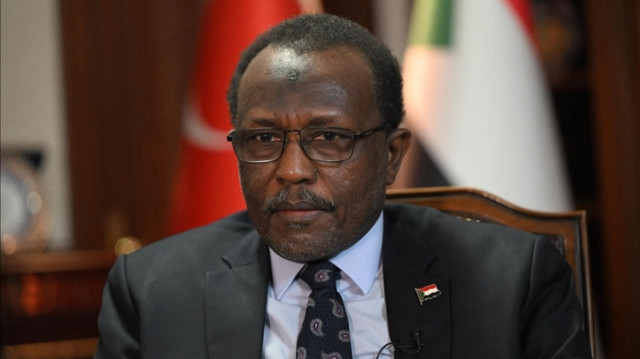
‘Türkiye has always been very conscious and very careful about the situation in Sudan,' Nadir Yousif Eltayeb tells Anadolu
Sudanese Ambassador to Ankara Nadir Yousif Eltayeb expressed deep gratitude for Türkiye's continued support amid the ongoing conflict in his country.
“I'm also very grateful to Türkiye because its embassy in Port Sudan has always been there. Although many countries closed their embassies during the first weeks of the war, but Türkiye has been there until now,” Eltayeb told Anadolu in an interview marking Sudan's 69th Independence Day on Jan. 1.
Eltayeb emphasized the critical role Türkiye has played in supporting Sudan during this difficult time.
He thanked Turkish President Recep Tayyip Erdogan for his mediation efforts between Sudan and the UAE to promote peace and stability.
“Türkiye has always been very conscious and very careful about the situation in Sudan. He (Erdogan) is always very worried about the situation,” Eltayeb said.
In addition to diplomatic efforts, Türkiye has provided significant humanitarian aid to Sudan, including two emergency cargo flights carrying essential medicines in May 2023.
The envoy praised Turkish aid organizations, such as the Disaster and Emergency Management Authority (AFAD), for sending 8,000 tons of aid, including food, shelter, and medical supplies, over the past three months.
He also welcomed the reopening of the Turkish Cooperation and Coordination Agency's (TIKA) office in Port Sudan and announced that Ziraat Bank would soon resume operations in the city.
“Türkiye has been very helpful and very supportive to Sudan all this time. We feel that this is a time we should never forget the help and support from Turkey to Sudan around this very critical and difficult time.”
- 13 million people forced to leave their homes
Eltayeb, reflecting on Sudan's long history of struggle for independence, emphasized the significance of the day.
“Independence Day is a very great day for us in Sudan because it came after a long struggle against British colonialism, and we managed to attain independence,” he said.
Sudan declared independence in 1956, becoming the first sub-Saharan African country to do so. Eltayeb noted that Sudan's independence inspired other African nations to pursue their own liberation, launching a wave of independence movements across the continent.
As Sudan approaches its Independence Day, the ambassador highlighted the challenges facing the country.
He described a conspiracy aimed at destabilizing Sudan, which he claimed began in April 2023. The ambassador accused foreign-backed “traitors” of attempting to destroy the country, destabilize it, and alter its demographics by forcibly displacing millions of people.
“Thirteen million people were forced to leave their homes,” Eltayeb said. This war has been damaging to economy, to people, to even our well-being as Sudanese. People also lost their dignity and lost their well-being.”
He praised the resilience of Sudan's armed forces, joint resistance movements, and civilians working together to safeguard the country's independence.
- Sudanese army makes progress
Despite the ongoing war, Eltayeb pointed to signs of military success.
He noted that the Sudanese army had made significant progress in reclaiming territory, including regaining control of the southeastern Sinnar state and moving closer to liberating Gezira state's capital Wad Medani from the Rapid Support Forces (RSF).
The ambassador also reported near-total control of Khartoum, with residents returning from neighboring Egypt and northern Sudan.
In Darfur, the Sudanese army destroyed the RSF's largest military base, which housed large stockpiles of weapons, he added.
- Sudan's food supply situation is not ‘alarming'
Eltayeb highlighted that they are encouraging humanitarian aid and that NGOs, UN agencies, and brotherly countries have been allowed to send humanitarian aid to the people of Sudan.
He reassured that there is no major famine or food shortage in Sudan.
“Because I saw a report from the Minister of Agriculture last week which confirmed that these reports about the famine or food shortage did not consider the harvest for this season.”
He explained that Sudan had planted sorghum and millet in an area of over 16 million hectares, with most of the planting done during the rainy season between June and November.
The harvest is expected between December and January, providing some relief to the country's food security, he added.
There is a shortage, but “it is not that alarming”, he said, highlighting successful agricultural efforts during the rainy season. In northern and central Sudan, production is ongoing, he added.
“For medical equipment or medicines, there is a need for medicines. And I think there is also good support from friendly countries, especially Qatar, and even Türkiye,” he said. “However, we feel that the situation is under control so far.”

